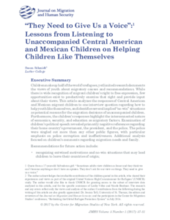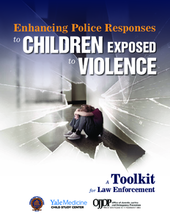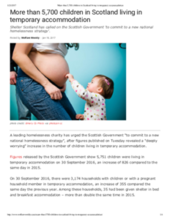Displaying 1951 - 1960 of 2509
The Center for the Human Rights of Children & The Gannon Center for Women and Leadership Present War Wounds: The Role of International Justice in Rebuilding the Rule of Law. This event will be held on Friday, February 3, 2017 from 8:30 A
The purpose of this study was to estimate the lifetime prevalence of official investigations for child maltreatment among children in the United States.
This review of the international research examines what is known about the placement of siblings in foster care.
This article analyzes the responses of Central American and Mexican migrant children to one interview question regarding how to help youth like themselves, and identifies several implied “no-win” situations as potential reasons for the migration decisions of unaccompanied children.
This new toolkit provides practical tools and resources to assist law enforcement agencies in building or enhancing effective operational responses to children exposed to violence (with or without a mental health partner). This toolkit contains tools targeted to police leaders and frontline officers.
Slate reports the poor conditions unaccompanied girls face when they attempt to cross the border into the United States from Central America.
Under the guidance of the Senior Adviser, the Child Protection Specialist for Community based child protection and psychosocial support in emergencies will provide programme guidance and technical support to enhance UNICEF's approach to the provision of psychosocial support for children and women in emergency situations, both natural disasters and armed conflicts.
SOS Children's Villages International seeks an advocacy advisor to work in its New York offices.
Scotland sees a marked increase of children in temporary housing over last year.
In this video from The Dr. Phil Show, Dr. Phil discusses the foster care crisis in the U.S. and the negative impact over-reliance on foster care can have on children and families.




